There is a group of people in Guyana who are suffering in silence as they are scorned and discriminated against; some even face physical abuse.

The group includes sex workers and men who have sex with men (MSM). While this is not the only group that faces discrimination and condemnation, it is believed that this is a unique situation as while there is sympathy for other groups in some quarters of society there is almost none for this group. The ‘moral police’ quickly stamp upon every effort made to garner support and recognition of the plight of this group.
The media were also called upon to portray this group of people in a more positive light so as to change public perception about them. But what is worse is that sex workers and MSM contribute to the ongoing discrimination by discriminating against each other; making their situations even more difficult.
Nevertheless, they are seeking acceptance by society and to be treated as human beings. This was the clarion call by a group of twenty sex workers and MSM who met at a recent workshop to discuss their plight. What was obvious from the lively and sometimes sad discussions at the Sidewalk Café is that these men are women have a yearning for an improved standard of living and to be respected.
“We want to be treated like human beings; we want [society] to treat us with respect. Why they can’t understand that it is our job and we are doing out job?” one young woman asked. It was the same question that was asked by everyone present and the sadness of their situation reflected not only in their voices as they passionately advocated for change but also in their eyes.
But hope is not lost as the group of 20 who were brave enough to participate in the workshop, organised by the Caribbean Vulnerable Com-munities Coalition (CVC) and Guyana RainBow Foundation, have vowed to make a change. They pointed out that for change to happen they have to take up the fight at the forefront and be supported from behind.
“We have to come out of the closets, we have to come out and fight for our rights we have to make a start…” one of the more passionate participants said. And at the end of the workshop a stepping stone was established in the form of the Guyana Sex Worker Coalition (GSWC), the first ever national sex worker organisation in Guyana. The organisation, which it is hoped will have at least two representation from each region in Guyana with some of the large regions having more than two on its steering committee, will be officially established come next January. An interim chairman, in the name of Winston Cossiah of the United Bricklayers Organ-isation, a sex worker group in New Amsterdam, was elected. The organisation will be made up of sex workers and persons who are working for the rights for sex workers.
“You must be clear that persons who join do not work towards changing you but in fact are working for your rights because there will be people who will join to work to change you,” Programme Manager of the CVC, Ian McKnight, one of the three facilitators of the workshop warned. The other two facilitators were Colleen McEwan of Guyana RainBow and Joel Simpson of the Society Against Sexual Orientation Discrimination (SASOD).
‘Must come
together’
Members of the group who wore nametags such as Diamond, Passion, Pleasure, Pain and Apple, were adamant that sex workers and MSM must come together if they are to achieve anything. It was pointed out that on many occasions they fight among themselves and discriminate against other; almost hating each other.
“I woulda pick a stick and beat dem myself because I use to think that they are getting something I want,” one of the female sex workers stated when asked what she thought of MSM. However, she said the workshop has helped her to see things differently and she sees the benefit of them coming together and working towards a common good.
“We are all going through the same thing, people discriminate against all of us,” another female sex worker said adding that the only way they can change their situations is if they work together.
And some of the females noted that they even discriminate among themselves. “It is all about who more good looking and who get a better body,” one said.
‘How you carry
you self’
One of the MSM participants said they could help to reduce the discrimination and physical abuse by carrying themselves in a certain manner in society.
“If I put on a pum-pum shorts and wear heels with a long wig… people go laugh at me, deh guh trouble me or some a dem will even pelt me. But if I put on normal men’s clothes and walk down the road nothing will happen,” the participant said.
Another MSM noted that not only would they be abused, but prospective clients may not want to approach them because of their dress. “If I wearing woman clothes the client ent go want to come to me, but if I dress like a man den we can walk down the road and nobody will think anything we will look like friends,” he said.
It was also pointed out that police officers may arrest you or “chase you out” the station if you went to make a report dressed like a woman. “But if you dress like a man and go in and be orderly and make the report deh police will listen to you.”
But not everyone agreed with notion that the men face more physical and verbal abuse when dressed like women as some stated that there are men who dress like women and walk down the streets and are not bothered.
“Which street you talking about? You ask anyone of dem and deh go tell you that at least somebody make a remark,” one of the participants stated.
“And is why you think ‘Buxton Girl’ in the hospital? Is nah beat deh beat he out of he woman clothes?” one of the more passionate participants asked while he mentioned another case of an MSM’s hair weave being dragged out of his head.
Some of the women also said that should they carry themselves with more respect then people would respect them. “If we carry we self lawless and brawling then we would not get respect, we have to give respect to earn respect.”
Challenges
Many of the persons who work the streets spoke about being called terrible names and in some instances being pelted by members of the public. They also complained about police harassment and clients who refused to pay after receiving their services.
Those who operate from brothels spoke about abuse from their employers, which is sometimes both verbal and physical. They are also sometimes abused by their clients and in some instances by bar owners who arbitrarily raise their prices. Some brothel owners also demand advance payment before they can leave the premises.
Law and
the church
While at the end of the workshop most of the participants left with a bounce in their step and the knowledge that there is much they themselves can do to ease their situation, they were not ignorant to the fact that two of the biggest stumbling blocks towards achieving their rights are the law and the church.
Prostitution and men are having sex with men are illegal in Guyana. Both are also regarded as sins, according to religious beliefs.
While it would be a monumental task, sex workers and MSM agreed that the way forward also included convincing the powers that be to legalise prostitution and sodomy. They are cognizant that this would be vehemently opposed by the church, but are prepared to fight the fight.
“If we have to take to the streets and call for our rights we would do it, we would demonstrate. We must come out and let our voices be heard; let people see we as human beings,” one of the participants said.
One of the ideas floated at the workshop is to invite police officers to a workshop so as to sensitise them to the plight of sex workers and MSM. However, the problem with this is that police officers may turn up and arrest those present as in their presentations they would be admitting to committing a crime. This, the workshop heard, had happened in another country under the same circumstances.
But the group discussed a “simple” strategy to counter this problem, which will remain a secret.
The group feels a workshop is necessary to educate the police, although not only law enforcement officers need educating, but also the wider population. The workshops will target some of the key stakeholders in society.
And should prostitution be legalized, the participants said, they are willing to pay National Insurance and taxes because it would be to their benefit to be able to receive pensions on retirement.
A similar workshop was already held in Jamaica and Trinidad and Barbados are also have such workshops in those islands shortly.
McEwan told Stabroek News she would be compiling a proposal based on what was discussed at the workshop and sending it to their international donors for approval and possible funding for the oganisation.

